|
|
|
Sort Order |
|
|
|
Items / Page
|
|
|
|
|
|
|
| Srl | Item |
| 1 |
ID:
110252
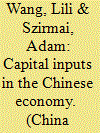

|
|
|
|
|
| Publication |
2012.
|
| Summary/Abstract |
This paper presents new estimates of capital inputs in the Chinese economy. Estimates are made for the total economy (1953-2007), for the industrial sector (1953-2007) and for manufacturing (1985-2007). The capital input estimates for industry and manufacturing are also broken down by thirty regions. The paper makes a systematic attempt to apply SNA (System of National Accounts) concepts to the estimation of capital inputs, according to the Perpetual Inventory Method. It makes a clear distinction between capital services from a productivity perspective and wealth capital stocks. The paper provides a detailed analysis of the relevant Chinese statistical concepts and data. It provides an explanation of the procedures followed in constructing the new national and regional capital input series.
|
|
|
|
|
|
|
|
|
|
|
|
|
|
|
|
| 2 |
ID:
128946


|
|
|
|
|
| Publication |
2014.
|
| Summary/Abstract |
In this article we set out a fine-grained measure of the formal authority of intermediate subnational government for Indonesia, Malaysia, the Philippines, South Korea, and Thailand that is designed to be a flexible tool in the hands of researchers and policymakers. It improves on prior measures by providing annual estimates across ten dimensions of regional authority; it disaggregates to the level of the individual region; and it examines individual regional tiers, asymmetric regions, and regions with special arrangements. We use the measure and its elements to summarize six decades of regional governance in Southeast Asia and conclude by noting how the Regional Authority index could further the dialogue between theory and empirics in the study of decentralization and democratization.
|
|
|
|
|
|
|
|
|
|
|
|
|
|
|
|
| 3 |
ID:
153716
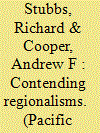

|
|
|
|
|
| Summary/Abstract |
As regions become more institutionalized, they are characterized by two competing trends. First, key regional institutions can become hub institutions that act as transmitters of a comprehensive set of norms. Second, as regional institutions increase in number, regions themselves are liable to become more fragmented. How these trends have played out is explored in two key regions, the Americas and the Asia-Pacific. It is concluded that regions are not static entities but are ever-changing structural arrangements. Hub institutions can be challenged and the consequences can be significant as regions gain in importance on the international stage.
|
|
|
|
|
|
|
|
|
|
|
|
|
|
|
|
| 4 |
ID:
167403


|
|
|
|
|
| Summary/Abstract |
The regional roles external actors play, such as ‘China’s role in Africa’ or ‘the US role in East Asia’, have long been popular subjects of analysis in the international relations literature. Yet, the emergence and evolution of these roles remains remarkably under-theorized. While some ‘new regionalist’ scholars have discussed the dynamics of an external actor’s regional involvement by referring to the concepts of ‘penetration’ and ‘socialization’, neither concept, this article argues, is sufficiently equipped to capture how external actors come to aspire and realize their regional roles. To address this shortcoming, the article employs an interactionist role theory perspective, which draws on the work of social psychologist George Herbert Mead. In following this perspective, the article argues that external actors develop regional role aspirations as they draw on their creativity and reflexivity to overcome experienced uncertainties. To realize these aspirations, the article suggests, external actors seek to cast significant others into corresponding roles. Alter-casting, the article argues in this context, is critical for understanding the (re)constitution of an external actor’s regional role, and thus a region’s social structure.
|
|
|
|
|
|
|
|
|
|
|
|
|
|
|
|
| 5 |
ID:
191847


|
|
|
|
|
| Summary/Abstract |
For the first time in its history, Ghana held a referendum in 2018 to divide some of its regions to create new ones. Though the regions are purely administrative, the division faced resistance in some areas and not in others. This study combines qualitative comparative analysis with process tracing to show that the resistance occurred within regions with relatively high support for the opposition party, but only in the combined presence of (traditional) elites competing from either side of the region and controversies regarding claims to (traditional) political authority. Further, it finds a bottom-up mechanism of the resistance, evolving as the threatened interests of stakeholders grew from the community to the regional, national and diaspora levels. As in other African cases, this suggests that the sources of conflicts in Africa are not so much about ethnic differences but more about elites’ unequal access to political and economic resources.
|
|
|
|
|
|
|
|
|
|
|
|
|
|
|
|
| 6 |
ID:
163562
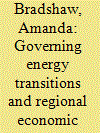

|
|
|
|
|
| Summary/Abstract |
States, regions, and municipalities have a growing importance in innovating policies to promote renewable sources of energy. This article examines the contribution of three state governments in developing and deploying wind and solar energy technologies in Brazil. The Brazilian electricity sector represents an interesting case of a middle-income country that is distinguished by strong federal involvement in energy governance and a reliance on hydroelectric power, followed by natural gas and coal. Using interviews conducted with policymakers and energy professionals, we find that regional energy transitions emerge as part of a process where state-level actors frame renewable energy choices primarily in terms of economic development opportunities and improving energy security. The engagement of regional institutions and organizations with energy priorities further influences the development of renewable technologies. The main policy implication is that state governments can have a strong role in the learning and niche formation of renewable alternatives that have been given less priority at the national level. This paper concludes that future policies should investigate how to scale up state renewable energy programs and initiatives.
|
|
|
|
|
|
|
|
|
|
|
|
|
|
|
|
| 7 |
ID:
160605
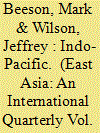

|
|
|
|
|
| Summary/Abstract |
There is nothing natural, timeless, or essential about regions. The very idea of regions is necessarily a comparatively modern artifact of human history. While there is still debate about quite who discovered whom, the general point is clear: until advances in navigation and exploration made connections feasible between geographically remote places, the very idea of different, separate regions was impossible. Without an “other” to be identified in opposition with, no sense of distinct regional identity or boundaries is possible. Even when it became apparent to Europeans that there was an entire “new world” beyond the horizon about which they had only limited or no knowledge, it would take a long time before the contours and boundaries of new regions would be understood and mapped. Significantly, the East Asian part of this unknown world was not only more economically developed, “civilized,” and technologically advanced than Europe [6, 8], but some of the patterns of interaction that existed before European intrusion have had enduring consequences.
|
|
|
|
|
|
|
|
|
|
|
|
|
|
|
|
| 8 |
ID:
098541
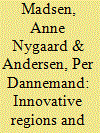

|
|
|
|
|
| Publication |
2010.
|
| Summary/Abstract |
Regional governments in Europe seem to be playing an increasing role in hydrogen and fuel cell (H2FC) development. A number of regions are supporting demonstration projects and building networks among regional stakeholders to strengthen their engagement in H2FC technology. In this article, we will analyse regions that are highly engaged in H2FC activity, based on three indicators: existing hydrogen infrastructure and production sites, general innovativeness and the presence of industrial clusters with relevance for H2FC. Our finding is that regions with high activity in H2FC development are also innovative regions in general. Moreover, the article highlights some industrial clusters that create favourable conditions for regions to take part in H2FC development. Existing hydrogen infrastructure, however, seems to play only a minor role in a region's engagement. The article concludes that, while further research is needed before qualified policy implications can be drawn, an overall well-functioning regional innovation system is important in the formative phase of an H2FC innovation system.
|
|
|
|
|
|
|
|
|
|
|
|
|
|
|
|
| 9 |
ID:
160060


|
|
|
|
|
| Summary/Abstract |
An assumption runs through this symposium that peaceful change is desirable and ought to be encouraged. We do not believe it is that simple. The term “peaceful change” itself is not well defined. The article, therefore, narrowly defines peaceful change as a process whereby a hegemon voluntarily cedes its dominant geopolitical role to a challenger in one or more regions. Drawing on neoclassical realism, we hypothesize that a declining hegemon will only accept peaceful change if: (1) it has high confidence change is inevitable because it lacks the military, economic, or political means to resist it; or (2) when domestic political or economic costs of resistance of prohibitively high; or (3) when the leadership of the hegemonic state faces domestic constraints in its ability to enact policies to resist the challenger.
|
|
|
|
|
|
|
|
|
|
|
|
|
|
|
|
| 10 |
ID:
193298
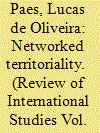

|
|
|
|
|
| Summary/Abstract |
This article proposes a processual–relational perspective on region-making and its effects in world politics. It revisits the concepts of regionalism and regionalisation to unearth the relational mechanisms underlying these archetypical pathways of regional emergence. Regionalism refers to the bounding of regions – the definition of its inside and outside, and of which actors fall on either side. Regionalisation denotes the binding of regions, the amalgamations of relations around a shared territoriality. I argue that regions affect world politics in their making through the boundaries raised and relations produced in the process. I then mobilise network theory and analysis to propose a framework for studying the making and makings of regions. Regions’ binding and bounding are rooted in brokerage dynamics that sustain clusters of relations denser inside a regional boundary, rather than outside, and allow some actors to control interactions across that boundary. I illustrate this framework with a case study on the emergence of the Amazon as a region in world politics. I analyse interaction networks in UN-level environmental negotiations involving the ecosystem. The analysis shows how the making of the Amazon has been tied to preserving the position of Amazonian states as the main brokers, speaking for and acting on behalf of the region.
|
|
|
|
|
|
|
|
|
|
|
|
|
|
|
|
| 11 |
ID:
121103
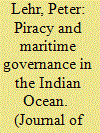

|
|
|
|
|
| Publication |
2013.
|
| Summary/Abstract |
During the late 1990s and the early 2000s, this author conducted a comparative study on regime building in the world's three maritime 'mega regions', i.e., the Atlantic, the (Asia-) Pacific and the Indian Ocean. The aim was to explain why regime building is so difficult in the latter as compared to the former two, and why newly formed regimes tend to end up as 'sandbanks of shattered hope' soon after their inauguration. Many reasons were offered both by the author's numerous respondents and by the author himself, but amongst the findings was the widely shared opinion of specialists from various Indian Ocean Rim countries that attempts at regime building tended to fail because their aims and objectives were too lofty. Rather, it was argued that regime-building attempts should start on the relatively modest level of confidence building measures which all potential participants could agree on, such as disaster relief, search and rescue (SAR), sustainable development of marine resources, fisheries protection, and the fight against piracy. All those measures can be subsumed under the label 'maritime governance', which will be define below.
|
|
|
|
|
|
|
|
|
|
|
|
|
|
|
|
| 12 |
ID:
143207
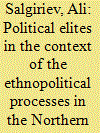

|
|
|
|
|
| Summary/Abstract |
The main role in these processes belongs to the local ethnopolitical elite (regional heads and their closest circles, business elites, clergy, etc.), who also rely on traditional ethnic institutions, national culture and time-honored practices, another source of influence on the masses. The federal Center has to take into account the interests of the ethnopolitical elites rooted in clan, family, and teip solidarity and realized through informal patron-client relationships. The elite’s closeness and durability are significantly slowing down the democratic processes in the region and interfering with the development of civil institutions.
|
|
|
|
|
|
|
|
|
|
|
|
|
|
|
|
| 13 |
ID:
088901
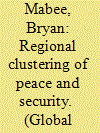

|
|
|
|
|
| Publication |
2009.
|
| Summary/Abstract |
The aim of this article is to comprehend how peace and security cluster at the regional level. In a globalized and interconnected world, each polity engages in a wide range of different relationships with other polities. Peace and security embody one of these relationships, since to feel secure or to be in peace entails managing a relationship with the 'other'. This article is divided in three parts. First, it briefly assesses classical theories of regional security in order to detect some of their shortcomings and to propose an alternative path. Second, it breaks down the concept of regional security in order to pinpoint two different (albeit sequential) empirical manifestations of regional security: regional violence-insecurity and regional peace-security. This dichotomy is associated to the passive and active components of peace and security. Third, the article describes the different paths that lead to the regionalization of peace and security (in its dual dimension).
|
|
|
|
|
|
|
|
|
|
|
|
|
|
|
|
| 14 |
ID:
133152


|
|
|
|
|
| Publication |
2014.
|
| Summary/Abstract |
Research on interstate mediation tends to assume (implicitly) that regional factors have little effect on the occurrence of mediation. We relax this assumption and advance an explicit regional theory of mediation in which regional ties create a type of bias that motivates both (potential) third parties to mediate conflicts within their region and disputants to select or accept these regional actors as mediators more frequently than non-regional actors. This bias first appears when states belong to the same region. In such situations, the potential third party and disputants likely understand one another better and share common security concerns. Yet regional membership does not explain the variation in mediation behavior within regions. To account for this, we argue that regionally more powerful states, as well as those that share (regional) institutional memberships with the disputants, have greater incentives to mediate than some regional counterparts. We empirically test the effect of these characteristics on the likelihood of mediation in militarized interstate disputes during the period 1946-2000. Our findings uncover support for our argument and suggest that accounting for regional bias is important in explaining mediation patterns in interstate conflict.
|
|
|
|
|
|
|
|
|
|
|
|
|
|
|
|
| 15 |
ID:
176228
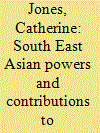

|
|
|
|
|
| Summary/Abstract |
Regions are becoming increasingly central to both the implementation and claims to legitimacy of UN peacekeeping operations. In 2008, in the UN Secretary General published a report on the relationship between the UN and Regional Organisations (S/2008/186**), highlighting that UN-regional partnerships should develop to entail wider capacity building activities, define and refine the responsibilities of regions and the UN in both Chapter VIII and non-chapter VIII activities, and perform functions in support of disarmament and mediation. However, ten years after the UN Secretary General’s report and four years after the HIPPO report there is still an urgent need to understand how, and in response to what drivers, are UN peacekeeping operations changing? In this paper I argue that because of the UN’s approach to partnerships it excludes learning from the contributions of other global potential partners including ASEAN. As a result, although there are pathways that make it possible for such a transfer of knowledge and experience, but these are often blocked—or perhaps just obscured—by the practices within the UN; for example, the institutional stickiness around partnerships.
|
|
|
|
|
|
|
|
|
|
|
|
|
|
|
|
|
|
|
|
|